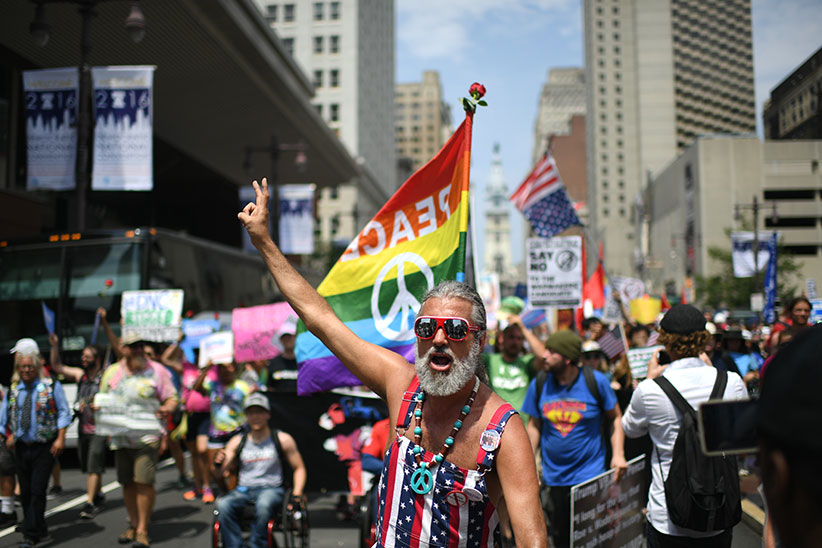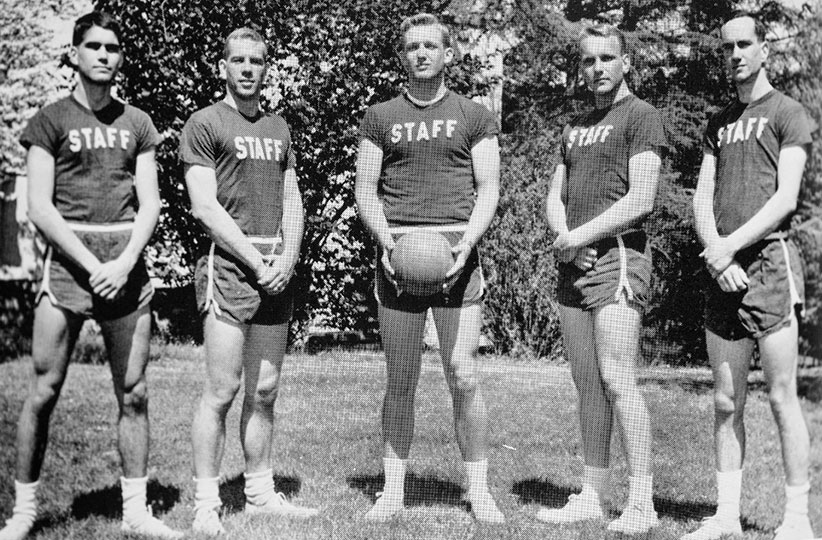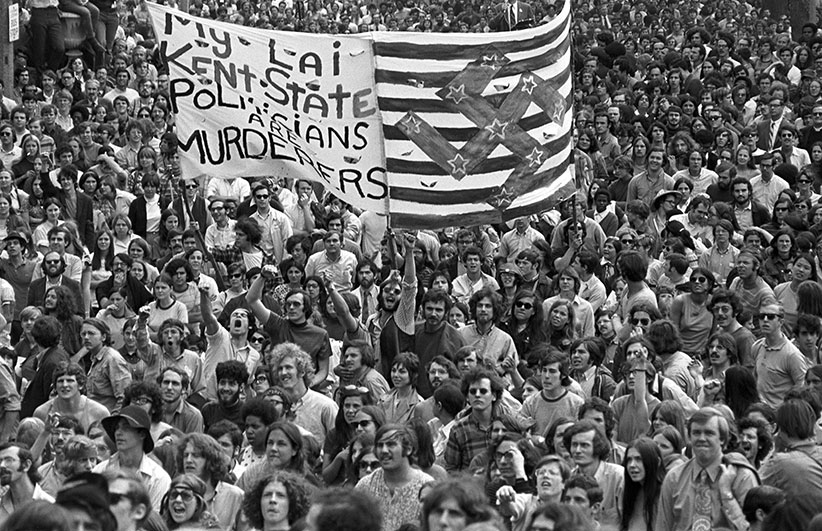Blame the Boomers for this, too?
How the protest generation of the ’60s left behind division, violence—and Trump and Clinton
Bernie Sanders supporters march down Broad Street, during the first day of the Democratic National Convention in Philadelphia on Monday, July 25, 2016. (Jabin Botsford/The Washington Post/Getty Images)
Share

There’s something happening here. Barring a return to presidential politics by Bernie Sanders when he is 99 years old, the winner of this year’s U.S. election will be the final American who came of age in the ’60s to occupy the Oval Office.
The flower children are going, and when they depart the stage, it all leaves with them: the tie-dye and granny glasses, the bell-bottoms and sitars, the love beads and macramé, the incense and peppermints, Vietnam and Watergate, Woodstock and Apollo, Janis and Jimi, “California Dreamin’ ” and Buffalo Springfield. Left behind are Donald Trump, age 70, and Hillary Clinton, 68: the last two hippie-dippie children still standing in this groovy Summer of Love.
How had it come to pass that, of all the babies born in the U.S.A. between the end of the Second World War and the heyday of the Howdy Doody Show, the finalists to pull down their final curtain would be Clinton and Trump? And how could it be that, 50 years after they took to the streets in their millions against war and inequality, against the old ways and the old ideas, they were leaving behind a world still so inequitable and violent, so greedy and divided?
In the 1960s, they had loosed a genie—the power of impassioned, exultant protest—on their parents’ square and staid world. They were stardust, they were golden — or so they thought. But that was half a century ago.
Now, they were the elders, and all their achievements seemed to an even younger generation only to have engendered more inequity, more bombs, more lies and more greed. So, in the summer of Trump and Clinton, the streets were filling once again with anguished cries and tribal chanting, some for him, some for her, and some for tearing it all down and starting over.
For the last children of the ’60s, the prototypical Boomers, it was all coming back around. Or, as the acerbic cartoonist Walt Kelly — creator of Pogo Possum—wrote on a poster for the first Earth Day, back in 1970, when the world and the next president were young: “We have met the enemy, and he is us.”
The morning was hot and clamourous. It was the first day of the Republican National Convention in Cleveland, Ohio, and revolution — not to mention revulsion — was in the soupy air. War Memorial Plaza was smattered with latter-day Lenins singing songs and carrying signs, shouting their ultimatums and striving to rouse the bourgeois rabble. There were maybe 30 protesters and maybe 300 reporters and cameramen. Except for the iPhones and the $150 sneakers, it could have been 1968.
“Down with capitalism!” howled the pampered renegades.
A college boy walked around in a T-shirt with the image of the Great Helmsman of the People’s Republic of China, handing out leaflets in support of the Revolutionary Communist Party.
“If you go carrying pictures of Chairman Mao, you ain’t gonna make it with anyone anyhow,” someone informed the lad, but this sailed right over his head.
Another of the young revolutionaries was a Syrian-Libyan-American named Danya Zituni, a student at the University of South Florida and a member of the “New SDS,” reprising the name of the courageous Students for a Democratic Society activists who were at the forefront of massive anti-Vietnam War protests on university campuses and at political conventions 50 years ago.
“Donald Trump represents white-supremacist fascists,” Zituni declared. “And Hillary Clinton also is an established war criminal and the preferred candidate of Wall Street.”
Watching all of this from a bench in the sun were two relics of the ’60s named Anne and Bix.
“Why are you here?” they were asked.
“Why wouldn’t I be here?” Anne Feeney replied.
Bix, a retired ironworker and staunch union man from Manhattan whose real name is Wilbert D. Books, Jr., had lost some of his voice box to cancer. Feeney, former president of the Pittsburgh Musicians’ Union and writer/performer of such anthems as “We Want National Health Care Now!” and “Have You Been to Jail for Justine?” was diagnosed in 2010 with small cell lung cancer and given a 10 per cent chance of five-year survival.
But it could have been worse. Books could have been drafted and shipped off to Vietnam 50 years ago and impaled on a bamboo stake in a Viet Cong booby trap. Feeney could have stayed home in New Rochelle and never toured with Pete Seeger. “She’s very popular in the leftie music scene,” Books growled, wearing a T-shirt of the War Resisters League and a ball cap that said “Make Donald Drumph Again.”
They weren’t a couple, but they had been through a lot together, including being arrested in Miami Beach in 1972, when the Republicans convened to nominate, for a second term, Richard Nixon, the president who defined their generation as its existential menace and establishment avatar. Half a century later, the old revolutionaries had outlived Nixon, but not their desire for social justice. They had come to Cleveland to take part in the “Dump Trump, Say No to the Republican Agenda, Stand against Racist, Anti-Immigrant and Anti-Muslim Attacks March.”
“Are you planning to get arrested?” Feeney was asked.
“I wouldn’t mind that at all,” the singer replied.
“The youth movement for justice today is bigger and more sophisticated than we were,” she noted. “They understand that everything is connected. We thought that if we just enforced the Civil Rights Act and ended the war in Vietnam, our battle would be won.”
“We did stop the war in Vietnam,” Books said. “Without us, it would still be going on.”
“It is still going on,” Feeney reminded him. “In Iraq.”
Books said that, back in his high-steel days, he had worked on the top two floors of Trump Tower.
“Nixon looks good compared to Trump,” Feeney said.
“So are you supporting Hillary?” the singer was asked.
“I have never spent so much time defending someone I despise as much as Hillary Clinton,” she replied.
“They are not going to carry the mantle of our generation,” Peter Kuznick was disputing. He is a professor of history at American University in Washington, D.C., and he was a member of the original SDS at Rutgers University in New Jersey, back in the day. (He also joined the National Association for the Advancement of Colored People at the age of 12 and the Congress of Racial Equality at 13.)
“Trump is some dystopian fascist nightmare,” the academician sniffed. “And could you imagine Hillary Clinton swimming naked at Woodstock?
“In many ways, they may both be children of the ’60s,” Kuznick went on, “but neither of them really participated in our movement in that moment of history. Hillary was a Goldwater Girl and a supporter of the war. My friends who knew her at Wellesley [College]say she was never one of us.
“Trump was one of those men we think of as chicken hawks, like Cheney and Bush, like Rush Limbaugh, who was disqualified for the draft because of a cyst.”

Despite his years of drill and riflery at the all-male New York Military Academy, Trump, a millionaire’s baby, neither volunteered to fight for his country in Southeast Asia nor was he drafted, thanks to student deferments at Fordham University and the Wharton School of the University of Pennsylvania and a bone spur in his heel. “I wasn’t a fan of the Vietnam War, that I can tell you,” he later said. “But I wasn’t a marcher.”
(Trump’s isolation would be proved again in 2016 in his widely condemned back-and-forth with the Muslim parents of the late Capt. Humayun Khan, a U.S soldier who died in combat in Iraq in 2004. Trump has “sacrificed nothing and no one,” Khan’s father said in a speech at the Democratic Naitonal Convention. “I’ve made a lot of sacrifices,” Trump later responded, including creating thousands of jobs building “great structures.” He also criticized Khan’s mother for standing silently next to her husband during the speech.)
At Wellesley College in Massachusetts, Hillary Rodham, president of the all-female campus’s Young Republicans, was known, a journalist later wrote, for “her Coke-bottle-thick glasses, her ponytail, her Navy blue pea jacket, big boots and brightly colored pants with a green book bag slung over her shoulder. They knew her for her eyes, wide and bright, and for the energy” she exuded. She, too, never marched against the war, but while Trump was trolling for women in his Ford convertible, Clinton was undergoing what one classmate called “a thoughtful and gradual evolution in her thinking” and, within months, was writing to a minister at home in Illinois that she was “leaning left.”
It is not as if primary voters and caucus-goers across the land were held hostage to Clinton and Trump’s superannuation. Marco Rubio was 44 and Ted Cruz was 45 when they surrendered to Trump. Martin O’Malley was 53 when Bernie Sanders impaled his candidacy. Sanders, Kuznick says, “reminds me of many people’s views of the 1960s. They think what motivated us was the draft, but nobody I knew really was worried about being sent to Vietnam. Middle class kids almost all got out of it. It was more of a generational concern for social justice.
“Those kids who rallied around Bernie Sanders, can Hillary be their leader?
“I don’t see how.”
Related: What needs to happen for Trump to win in November
Just so that everybody would be sure whose side he was on, Wil Van Natta showed up at the Democratic convention in Philadelphia in a red bandana and a Che Guevara T-shirt. He was a sunburned beach boy from South Florida, age 60-plus, who lived on a sailboat and who once sued Trump for $1 million after allegedly being manhandled by Trump’s bouncers while protesting at one of Trump’s golf courses. Trump counter-sued, both cases went nowhere, and now here was yet another child of the ’60s fuming at both major parties.
There were thousands of protesters like Van Natta in Philly, demonstrating lustily against everything from police brutality to palm oil, shutting down Broad Street and picnicking in the blistering sun at Franklin Delano Roosevelt Park. Half of them were of college age and burdened with more debt than Argentina. Half were ’60s radicals keepin’ on keepin’ on, just one last time.
“Hillary Clinton is perhaps the greatest representative of Western international capitalism,” said Van Natta, who described himself as a professional ocean lifeguard and former commercial diver. (He is also the former Florida state chairman of the Workers World Party.) “Her attitude is, ‘Just give ‘em abortion rights and you can bomb the hell out of anybody you want.’
“And Trump? Trump is an egomaniac who stands with all those Joe Six-Pack white males who think that everything is the fault of the blacks.”
“What do you think your generation will be remembered for?” the Guevarian disciple was asked.
“I think that the hallmark of our generation was that the solidification of hyper-consumerism was firmly implanted,” he replied. “We are seeing the death throes of Western capitalism. We are the final holdouts. We’re the people in Bolivia with Che.”
If there is a Ground Zero for the spirit and sadness of the generation that will give the United States its next president, it is an open field, ripe with birdsong in summer, on the campus of a college: Kent State.
Tin soldiers and Nixon coming, we’re finally on our own
This summer I hear the drumming, four dead in Ohio . . .
“I was 17,” Laura Davis was saying. She was a freshman at Kent State when Ohio National Guardsmen, ordered to campus in the wake of turmoil in downtown Kent during the previous few days and a series of anti-war rallies on campus that drew thousands of protesters, opened fire with live ammunition—for reasons not fully elucidated in 20 court cases over a dozen years—and left four students, armed only with ideals, dead on the ground. “It was in the ether that it was my responsibility to change the world. To tear down barriers of class and colour.”
Davis, now a professor emerita of English here, was in the museum on the Kent State University campus that interprets the events of May 4 in the larger context of civil rights and social upheaval—the cataclysmic forces that, whether they comprehend them or not, shaped the lives of Clinton and Trump and tens of millions of other Americans who now, divided by race, party, class, wealth, poverty, still struggle to endure as one nation under God.
“I think that I, and the people that I got to know here, succeeded in living according to the principles we learned here,” she said. “We learned to laugh at what our government was telling us. We believed that we could change the world, and this became the coda of our generation.”
“I think we shortened the war in Vietnam,” said Jerry M. Lewis, 79, an emeritus professor of sociology, who was witness to the rifle fire. “In the short term, it brought the war home to the American people. But it was not a pacifistic movement against all wars.” Lewis remembered singing “Give Peace a Chance” in front of his draft board, but he went into the army anyway, as a part-time clerk-typist far from the Viet Cong.
“Did you ever see combat?” Lewis was asked.
“Only here on May 4th,” he replied.
Nixon, Nixon, Nixon, Nixon.
“There are all these emails . . . You’ve got a massive amount of data—in a way, reminds me of the Nixon tapes,” Bob Woodward, one of the two Washington Post reporters who, in 1972, broke the Watergate break-in story that eventually led to Nixon’s resignation, told MSNBC last summer when asked about Clinton’s private email server.
“I do see for the first time, and I want to be very careful here, some parallels with Nixon’s paranoia, obsession with enemies, and self-destructive tendencies because of that obsession. Yes, I think there are some parallels there,” said Carl Bernstein, Woodward’s erstwhile stablemate, on the Hugh Hewitt radio program during the RNC.

“Here is Hillary Clinton, somebody who worked on the staff of the Nixon impeachment committee, and what was the lesson — one of the lessons from that?” Woodward mused on FOX News Sunday last January. “Never write anything down.”
“You’ve got a situation with these transcripts a little bit like Richard Nixon and his tapes he stonewalled on and wouldn’t release,” Bernstein said on CNN. And so forth.
“It’s Trump’s Convention. But the Inspiration? Nixon,” headlined The New York Times.
So it had come to this: Which of the two remaining candidates was least like the most disgraced Chief Executive in American history?
“Is Trump Nixon?” Susan Roman was asked on the convention floor at the Democratic confabulation in Philadelphia.
Roman was Bernie Sanders’s operations director in the Granite State, and therefore presumably neutral on which of the two remaining contenders was more or less of a crook.
“I think Trump’s much worse than Nixon,” she responded. “Nixon had a sense of history. Nixon had experience. There were many bad things about Nixon—he was corrupt to the point that he thought he could get away with lying to the American people. Trump doesn’t even care that he’s lying to the American people.”
“How about Hillary — is she Nixon?”
“Does the secrecy that sometimes you see in Clinton bother me?” Roman pondered. “Yes. But Nixon? I don’t see that.”
“I think what Nixon understood was that when the world is falling apart, people want a strong leader whose highest priority is protecting America first,” Trump said in July. “The ’60s were bad, really bad, and it’s really bad now. Americans feel like it’s chaos again.”
Related: The states on Hillary Clinton’s map to victory
“Whenever you decide to run for office, you will be a winner!” wrote Nixon in a letter to Trump in 1981.
“Did you know that Woody Guthrie lived in one of Trump’s father’s apartment buildings?” Anne Feeney queried.
The great balladeer spent two years dwelling in — and railing against—one of Old Man Trump’s uni-racial housing estates in Brooklyn circa 1950. Now everything was coming full circle, in the summer of 2016.
The Revolutionary Communists were at it again, parading around the plaza in Cleveland with placards that said “America was NEVER great.”
“This gives me hope,” Bix Books said.
“Are the kids angrier now than you were?” Feeney, the Leftie singer, Woody Guthrie’s daughter-in-spirit, was asked.
“No,” she answered. “I think they’re smarter, and there are a lot more of them. These kids are coming out of college $70,000 or $80,000 in debt, and they’re very disillusioned.”
“What do you want to be remembered for?” a reporter wondered.
“Without us, there’s no rape-crisis centres, no shelters for battered women, no Black Studies majors, no Women’s Studies departments,” Feeney said. “The whole feminist movement began with us. A husband and wife couldn’t even go into a drugstore together and buy condoms!”
Now the New SDS — all four or five of them — climbed up on a platform and made their vehement demands.
“You know what irritates me?” sighed Books, watching them gesture and howl. “It’s when these Lefties give the raised-fist salute with their right hand.
“Hey, man!” he called with what was left of his voice. “That’s the fascist salute. It’s always the left hand, brother,” said the old rebel. “Always the left hand.”